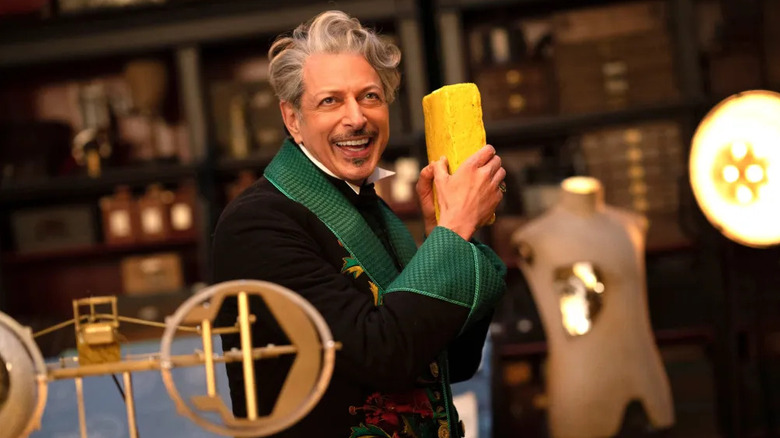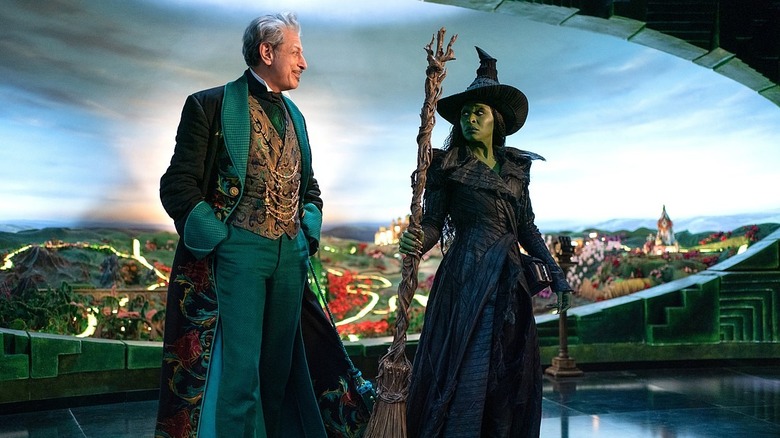The Best Performance In Wicked: For Good Isn't From Either Of The Oscar Nominees
This article contains spoilers for "Wicked: For Good."
Almost exactly one year ago, I gushed about how Jeff Goldblum's performance as the Wizard of Oz in Jon M. Chu's "Wicked Part One" was one of the most unique iterations of the character. Toward the end of the piece, I speculated that "All signs point to Goldblum having much more to do in next year's 'Wicked: For Good,' and one of the disappointments about this month's "Wicked: For Good" upon actually seeing it is that Goldblum's Wizard isn't in the film all that much more than he was in the first movie. That said, I was thankfully correct in assuming that the material he would be given in the film would be substantial and significant, and neither Goldblum nor screenwriters Winnie Holzman and Dana Fox let me down in that regard.
Of course, art is subjective, and your personal preference for who gives the best performance in "Wicked: For Good" may not align with mine. Certainly, the Academy Award-nominated Cynthia Erivo and Ariana Grande-Butera are acting (and singing!) their hearts out in the film as Elphaba and Glinda, respectively, and neither "Wicked" movie would be special without them. Yet as focused as the movies are on the dissolution (and eventual reconstitution) of their friendship, the entire premise of the story lives and dies with its revisionist take on the "Oz" tale. Thus, the character of the Wizard is incredibly essential, and both films wouldn't work without getting him correct. Fortunately, Goldblum not only delivers the best performance in "Wicked: For Good," but he also gives one of the best performances of his career, as he makes the "Wicked" saga deeper and more resonant than just a series of show-stopping musical numbers.
Goldblum proves that an epic is only as good as its villain
So much of the engine within both parts of "Wicked" is the dynamic between Elphaba and Glinda, with their "opposites attract" affection for each other being tested through increasingly high-stakes political and social dilemmas. It maybe would've been possible to tell this same story without a dynamic Wizard — maybe you could've had just Madame Morrible (Michelle Yeoh) pulling strings behind the scenes, or perhaps not even that. Yet it's Goldblum's Wizard who proves to be such a fantastic villain for the story, and crucially, the actor and the screenwriters understand this doesn't mean making the character a cartoonish mustache-twirling meanie.
The real secret sauce to Goldblum's Wizard lies in how delightful a presence he is on screen. "For Good" has an awkward first act as it attempts to reestablish the characters and stakes still to be resolved in this second film, yet when Goldblum turns up and leads Grande-Butera and Erivo in the number "Wonderful," the movie starts to soar. Though it's clear from the jump that the utopian family unit that this number envisions will never come to pass, it's this genuine yearning on the part of all the characters to come together that makes their differences so hard to overcome and, in the Wizard's case, their betrayals sting so much. The revelation that the Wizard was actually Elphaba's biological father may come as a surprise to some, but anyone paying attention to Goldblum's performance will have already picked up on his "deadbeat dad" vibes. The Wizard's ultimate exile from Oz is both dramatically earned and emotionally bittersweet, which is such a great spot for a villain to end in. He's clearly in the wrong, yet wholly understandable as a person.
'Wicked' may be politically confused, but Goldblum provides its depth
One of the most intriguing elements of "Wicked" is its revisionist and deconstructionist elements toward "The Wizard of Oz," which stems from the 1995 novel by Gregory Maguire. The Stephen Schwartz stage musical, which these films are adapted from, muddies that novel's ideas a little too much, and the confusion seen in the movie's political and social commentary is a byproduct of that. Elphaba, Glinda, Morrible, and Nessarose (Marissa Bode) are all multifaceted people, yet there's a sense of incompleteness about their various heel turns. In a better film, all of these characters would be deeply nuanced; only in Chu's hands, their multitudes feel less like intriguing complexities and more like contradictions.
Fortunately, that's not the case with Goldblum's Wizard, and it's a testament to the actor's skill that he's able to play all sides of his character while making him feel credibly whole. Yes, he's an opportunist, a con-man, and a selfish jerk, someone who sees no issue in locking up all the animals he viewed as his political opponents and lying to the citizens of Oz. Yet Goldblum makes it clear that the Wizard is not some Machiavellian overlord, but a man who genuinely believes he's doing the right thing. It's a fantastic portrayal of the banality of evil, particularly in terms of a political official. It's a performance which follows through on and builds upon the iconography of the character from the 1939 film, and one which, had the rest of the film followed his lead, promises a much deeper and more thematically fulfilling "Wicked." As it stands, at least Goldblum's Wizard is one of the best portrayals of the character in cinema history.
"Wicked: For Good" is in theaters now.


